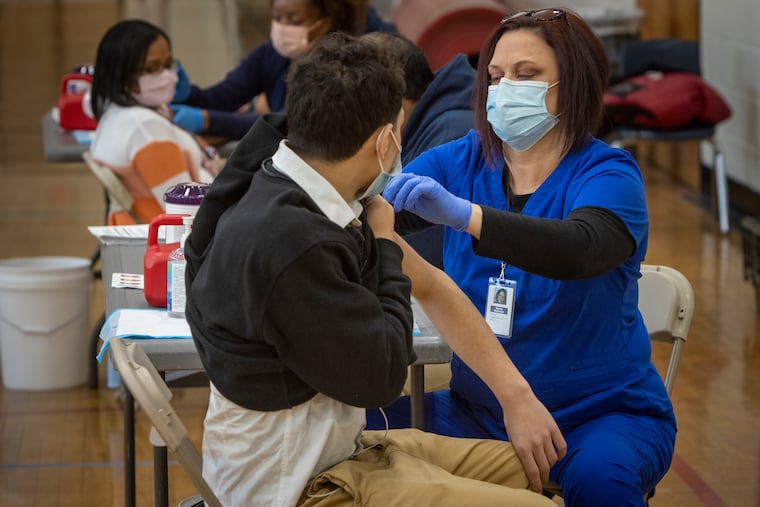Do I need the new COVID booster? And other questions you may have.
Should you get the new COVID booster? Here's what to know.

New COVID-19 booster shots designed to protect against recent variants are now available at pharmacies in Pennsylvania, New Jersey, and Delaware.
The updated vaccines, made by Moderna and Pfizer, are “bivalent,” meaning they teach the immune system to recognize the original coronavirus as well as the most recent versions of the omicron variant.
Here’s what to know:
How is the new COVID booster different?
The new booster is designed to protect against the original COVID strain as well as the latest “subvariants” of the omicron strain, which are causing a majority of new cases.
The bivalent vaccines contain two sets of genetic instructions in the form of messenger RNA, allowing the person’s cells to make harmless fragments of the coronavirus so the immune system can make antibodies and other defenses.
» READ MORE: CDC advisers weigh who needs updated COVID booster and when
One set of instructions is for the “spike” protein from the original coronavirus, the same as what was in the original vaccines. The other is for the spike from the BA.4 and BA.5 lineages of the omicron variant.
The original COVID vaccines still reduce the likelihood of severe illness and death. But now they are far less able to prevent mild infections, due to the mutations in the omicron strain. This updated combination vaccine is intended to reduce the risk of infection and prevent a surge in the fall, though breakthrough infections are still possible.
Researchers also expect it will reduce the risk of long COVID.
» READ MORE: COVID and other health crisis continue to take years off our lives, CDC says
Who is eligible to get the new COVID booster?
Eligibility depends on your age, when you received your initial vaccine, and when you last got a booster.
Anyone 18 years and older is eligible for Moderna’s updated booster, which is being given as a single dose. Anyone 12 years and older can get the Pfizer-BioNTech updated booster, also a single dose.
You must have had your most recent booster or your initial vaccine at least two months ago.
Still unsure? The CDC has an interactive tool to help you figure out when you should schedule your next shot.
» READ MORE: Friday is the last day to order free COVID-19 tests to your home
When will the new COVID booster be available?
Boosters are now available at pharmacies in Pennsylvania, New Jersey, and Delaware. Find a pharmacy offering boosters or initial vaccines online at www.vaccines.gov
When can I get a COVID booster shot after having COVID?
You can get your COVID shot or booster as soon as you’ve completed your isolation period. People who are asymptomatic should isolate for five days, then wear a mask for another five days, according to updated CDC guidelines. People with symptoms should remain isolated until their symptoms begin to improve and they no longer have a fever.
The CDC says you can wait up to three months after your illness to get a booster or initial vaccine, but it’s not necessary.
Contracting the virus offers some natural immunity to COVID. But everyone who is eligible should still get the vaccine and boosters for extra protection.
» READ MORE: New COVID-19 cases, deaths keep falling nearly everywhere, WHO says
Should I be concerned that the new booster was not tested in people?
No, FDA officials say. The new combination vaccine still contains the component from the original vaccines, which were extensively tested for safety and now have been administered to billions of people. What hasn’t been tested in people is the second component that is tailored to the most recent versions of omicron.
But that’s no reason for concern, as researchers have tested people with vaccines based on earlier versions of omicron, said Peter Marks, director of the FDA center that reviews vaccines.
The newer, authorized vaccine can be thought of as simply a tweak in the recipe to reflect the latest versions of omicron, while keeping the same underlying template — much like drug companies do with annual flu shots.
“What we’re doing here is what we do every year for influenza vaccines,” Marks said.